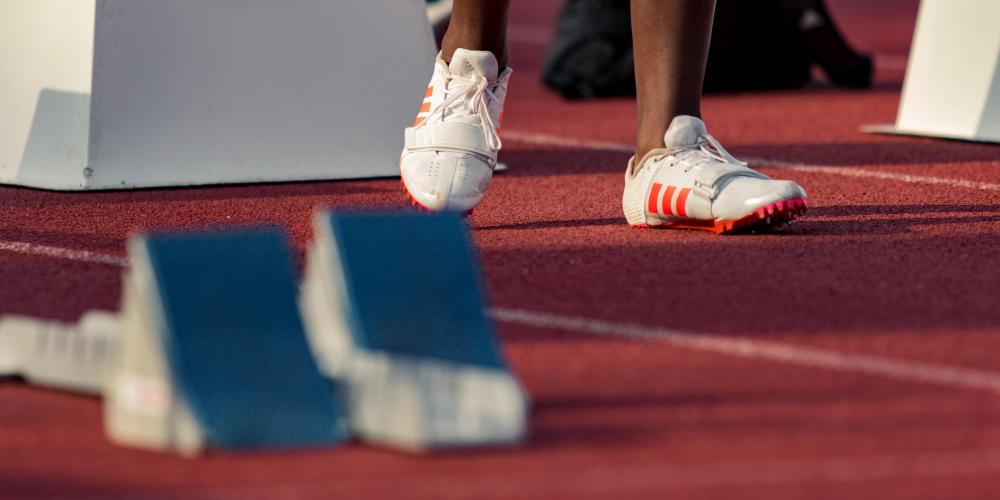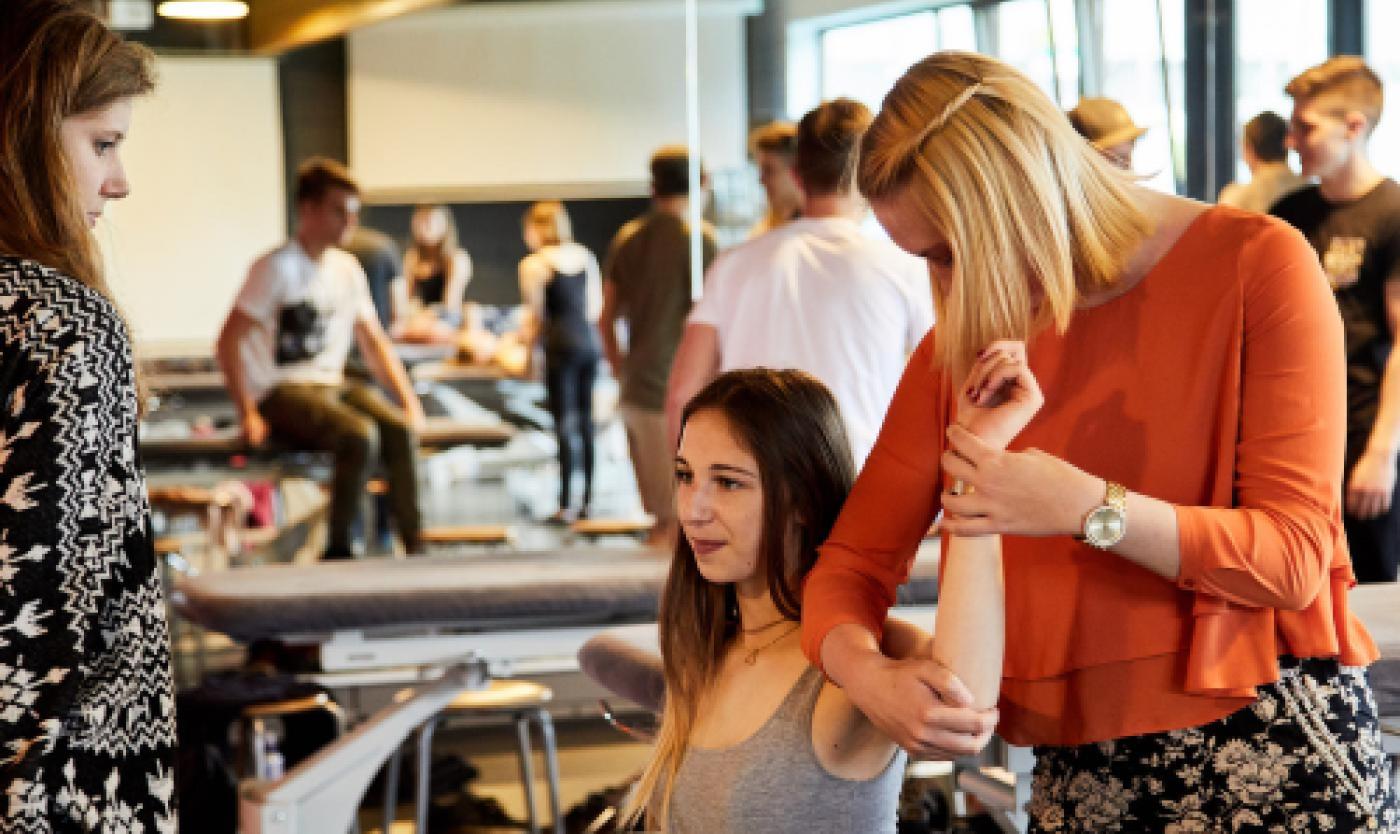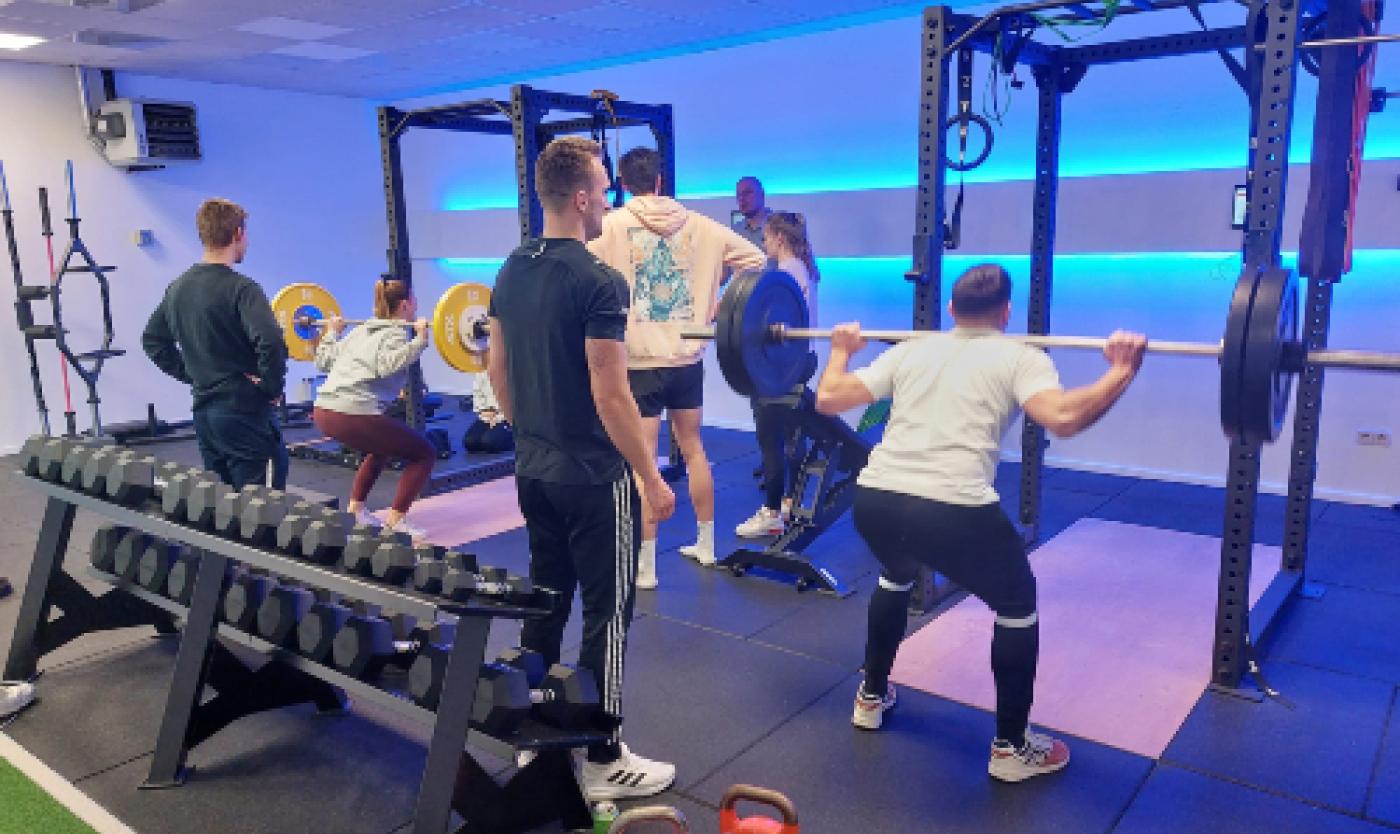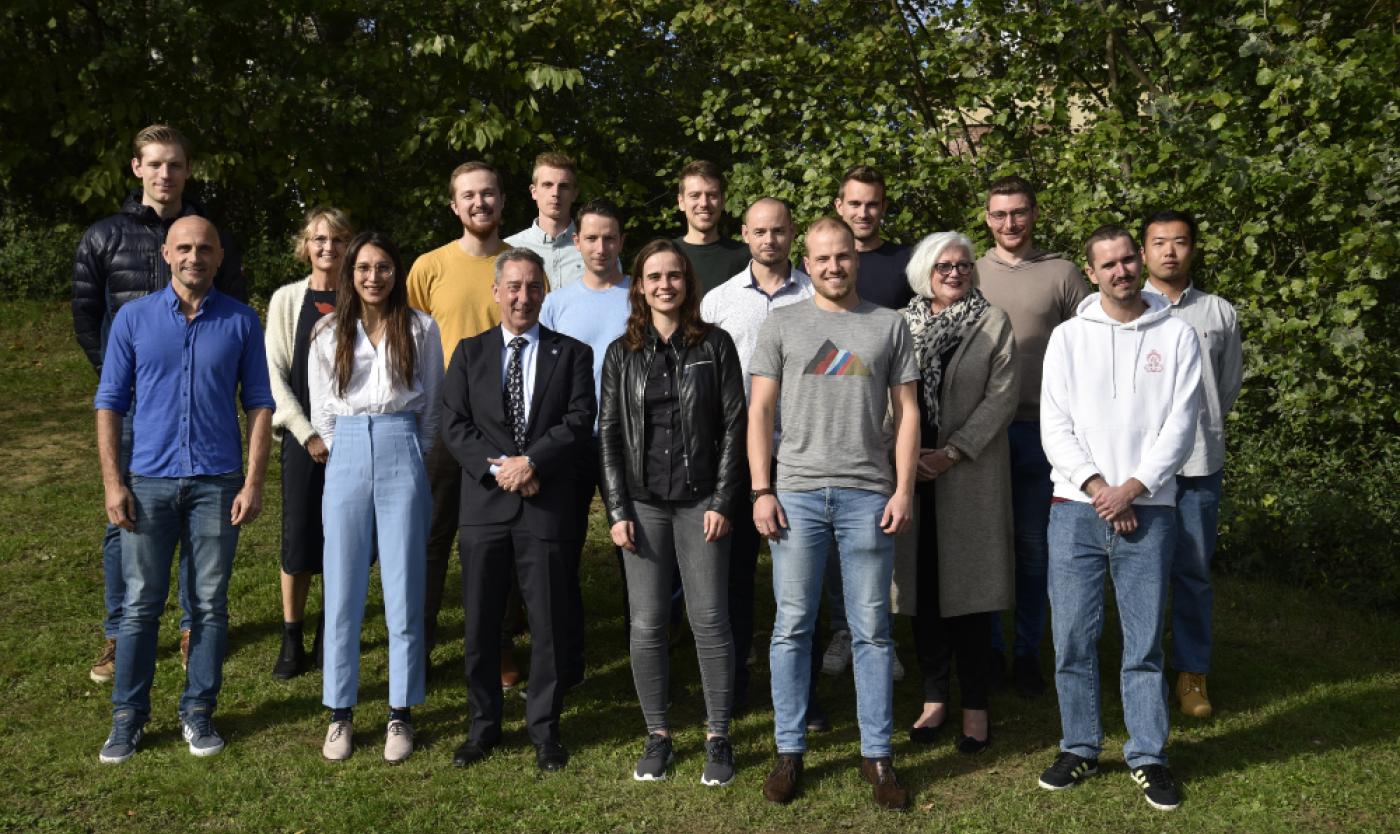
The VUB’s faculty for Physical Education and Physiotherapy has a high-profile position in Belgium and is also highly regarded internationally. This is mainly because physiotherapy programmes are relatively uncommon at university level in other countries. Combine this with the wide array of research that is conducted, and you get to a level of international renown. One of these research groups is MFYS, the Dutch acronym for ‘Human Physiology and Sports Physiotherapy’. A chat with Professor Bruno Tassignon reveals the different layers of the onion of the group’s work, and how it permeates through to the educational side of things.
MFYS focuses on research in the area of exercise and the brain, in health and disease. They look at the cross-sections of physical and cognitive effort with neurochemistry and physiology in both healthy subjects and patients. Research is conducted on three levels: the fundamental, the applied/clinical, and the policy-making level. “Our team and its wide-ranging research contribute towards education in our faculty, in both the ‘physical education and movement sciences’ track, and the ‘rehabilitation sciences and physical therapy’ track, and this at both Bachelor, Master, and postgraduate level,” Bruno explains.
Education
While most programmes are currently Dutch-taught, plans are underway to for instance develop an English-taught equivalent of the existing Master of Science in Rehabilitation Sciences and Physical Therapy programme. “There are a couple of things we need to check and delve into, before we put in the heavy lifting of a proposal for this, but it’s on our radar,” adds Bruno. The newly launched Postgraduate in Sports Physiotherapy, while Dutch-taught only, does contain a lot of internationalisation: “We get guest lecturers in, we organise symposia, we have a tie-in from our research, most of which is international, and very well known, so those relationships benefit our students across all levels of education as well,” Bruno continues.
Exchange opportunities are in place for students with a number of international partners both in and outside of Europe such as The University of the Western Cape (South Africa), Maastricht University (the Netherlands), UCD (Ireland), LIROMS (Luxembourg), and in Slovenia, but also with Elon University (USA). Bruno expands: “We have a long-standing partnership with Elon University that goes beyond student mobility. We have staff exchange with them and cooperate on a research level as well. The opportunity our students and staff studying/working in physiotherapy can get is incredible. It’s a whole different healthcare system in the US, so it’s an eye-opening experience and it boosts language skills too.”
Research
“While our research is organised into clusters, there is significant overlap and a high degree of interaction and collaboration among them. Not only within MFYS, or with the Brubotics consortium, and the university hospital UZ Brussel, but internationally as well.” The main groups are: Fatigue and the brain, performance and the brain; Human-centred robotics and the brain; Injury/Disease and the brain. Bruno explains: “The research done in ‘Fatigue and the brain’ looks at both physical and mental fatigue and its interactions with the central nervous system. ‘Injury/Disease and the brain’ in its turn works closely with the fatigue group, but also with human-centred robotics. The focus of the ‘Injury/Disease and the brain’ work is on musculoskeletal sports injuries (prevention, rehab, return to sport), overtraining syndrome, and non-communicable diseases such as diabetes, etc. ‘The human-centered robotics' main focus is currently on exoskeletons, prosthetics, human-in-the-loop-optimisation, and brain computer interfaces.” The research is very wide ranging so we highlight some of their work here below, but this is by all means not exhaustive!

Injury prevention, neurocognition and fatigue
The research focuses on injury prevention in relation to fatigue and neurocognitive aspects, in partnership with the Vrije Universiteit Amsterdam. Bruno expands: “They always say prevention is better than curing, but success in sports injury prevention programmes has been limited. The research we do contextualises injuries and their prevention by focussing on fatigue and an athlete’s changing environment and how readily they can adapt. It’s exactly this ‘adaptability’ where an athlete’s neurocognitive capability is assessed. The aim is to investigate the various types of physical and mental fatigue that influence a person’s injury risk profile, and the neurocognitive capability of the person in question”. A proposal has been submitted with FWO to follow specific people to check the fatigue mechanisms in practice and observe this in a real-world setting. The idea is to look for continuous measurement of semi-professional athletes. The small but manageable sample size would give a unique view into someone’s (athletic) life thanks to the high-frequency data collection. The end result would be practical feedback that physios can use in their work, so the patient can be asked pointed questions during their intake prior to starting treatment. This should ideally lead to individual fatigue profiles which can help athletes, coaches and clinicians. There is very close collaboration with Professor Evert Verhagen, from the Amsterdam UMC, a world-renowned human movement specialist and epidemiologist.
Contact: Jo.Verschueren@vub.be and Bruno.tassignon@vub.be

Returning-to-sport and the brain
It’s traditionally been the case that when someone suffers a sports injury, the focus was mainly on the affected area. However, recent research takes a more holistic approach, which has led to developing a more complex return-to-sport algorithm. Bruno explains: “We look at both peripheral and central variables, as well as psycho-social variables to come to the best possible decision. Another specialised area of interest, is to study how the brain adapts after musculoskeletal injuries. We also apply different fatiguing interventions to look at the interaction between the peripheral and central variables during functional performance tests. The research aims to get a better understanding of how the brain behaves during such tests, and the potential role of fatigue in making return-to-sport decisions. Having a more in-depth knowledge could lead to new and better treatment in clinical practice as well as a safer and more informed return-to-sport decision”.
Contact: Jo.Verschueren@vub.be and Bruno.tassignon@vub.be

Fatigue, performance and the brain
The research on physical and mental fatigue and performance has a significant international component to it, with ongoing collaborations with the University of Kent (UK), the University of Bologna (IT), the University of Canberra, Australian Catholic University (AUS), the Research Center in Koper (Slovenia), the Federal University of Paraiba (Brazil) and the Royal Military Academy in Brussels. This line of research looks, among others, at unravelling the mechanisms behind the negative effects of mental fatigue on cognitive and physical performance. It is an issue that is prevalent across society and the root cause of many accidents in everyday life (traffic accidents, accidents at work, in the home, etc). Specific focus is also directed towards the sports environment, and how endurance and psychomotor skills are affected by mental fatigue, both from a fundamental (looking at the neurophysiological elements behind it) and an applied perspective. This line of research also includes advanced brain measurements in association with nutritional and pharmacological interventions (creatine, caffeine, reuptake inhibitors, e.g.).
Contact: bart.roelands@vub.be

Human-centred robotics
Improving human-robot interaction is another key research focus within MFYS with different research areas, including industrial exoskeletons, exosuits, cobots, motorised prosthetics, and robotics control systems. The overarching vision is to improve the quality of life of all individuals, both healthy and patients, and to improve working conditions on the industrial work floor. The long-term perspective is (mass) adoption of human-centred robotics in society and economy through fundamental research into the design, control, evaluation and customisation of human-centred robotic technologies. To achieve this, interfaculty collaborations are ongoing with Robotics & MultiBody Mechanics research group, AILab, imec-SMIT and Artificial Intelligence supported Modelling in clinical Sciences. International collaborations are ongoing with CY Cergy (FR), University of Erlangen-Nuremberg (DE), Jozef Stefan Institute (SL), Fondazione Istituto Italiano di Tecnologia (IT), Université de Montpellier (FR), Universita di Pisa (IT), and Universiteit Twente (NL).
In addition to the focus on human-robot interaction, they actively pursue other research activities, including projects related to Covid-19 and the brain, fall prevention among the elderly, the study of music and the brain, and investigating human scientific aspects of ultra-endurance running.
Contact: Kevin.De.Pauw@vub.be
Ultra-endurance running: an example of where it all comes together
The MFYS core research lines all intersect with projects like the Backyard Project where physiological, medical, and cognitive data were gathered during an extreme ultra-endurance running event. Currently, two Belgian athletes hold the previous world record in backyard running, covering an astonishing distance of 677km without stopping. In April 2023, the MFYS team conducted a comprehensive study focusing on these athletes, aiming to investigate physical and mental fatigue, cognitive functions, nutrition, (micro) sleep, and performance.
The researchers collected various data points to gain insight into the athletes’ physiology and performance. Blood samples were obtained, their heart rate was continuously analysed and genetic information from micro-organisms was investigated. The ultimate goal is to establish a connection between physical and mental fatigue, and examine the impact of such an extreme event on heart function and cognitive abilities.
During the project twelve athletes underwent a thorough health screening at the MFYS’s Brussels Human Performance Lab (known as BLITS) including sleep research, cognitive performance tasks and maximal exercise tests on the treadmill. Through this research, MFYS aims to contribute to a better understanding of human performance, fatigue, and the impact of extreme physical events on both the body and brain.
Contact: Kevin.De.Pauw@vub.be
International events
VUB recently extended an award to an internationally recognised specialist in the field of sport and health sciences: Professor Andrew Jones from the University of Exeter (UK) was awarded an Honorary PhD by the VUB on Thursday 20 April 2023 for his research into the causes of exercise intolerance in healthy people and those with disabilities, the kinetics of respiratory oxygen exchange during exercises, and exercise physiology and nutrition during endurance exercises. He’s won several scientific awards and has experience in coaching top athletes, such as Paula Radcliffe, and was one of the scientists who was part of the sub-2h marathon project. He’s part of a very large international network of contacts that have a strong influence on the MFYS team’s research and education.
It's an example of the calibre of people the MFYS team works with on a daily basis. This international network isn’t only part of their research but also participates in international events organised by MFYS. A big one took place at the end of September (22-23 September 2023): the international congress on sports physiotherapy, organised by the Belgian Federation for Sports Physiotherapy (BFSP), with support from the International Federation for Sports Physiotherapy (IFSPT). It’s the first time such a big event on this topic was held in Brussels, and was an amazing opportunity to network with sports physiotherapists from across the world. Here again the link to MFYS is clear: Professor Jo Verschueren is on the board of the BFSP, and Chair of the organising committee and member of the scientific committee of the International Federation of Sports Physiotherapy.
All these international contacts ensure that the research and education coming out of the MFYS research group are second to none, which benefits the students in the BA/MA and postgraduate programmes.

To know more about the MFYS team, their research topics, and keep up to date with their latest events, check out their website, and follow them on their socials: